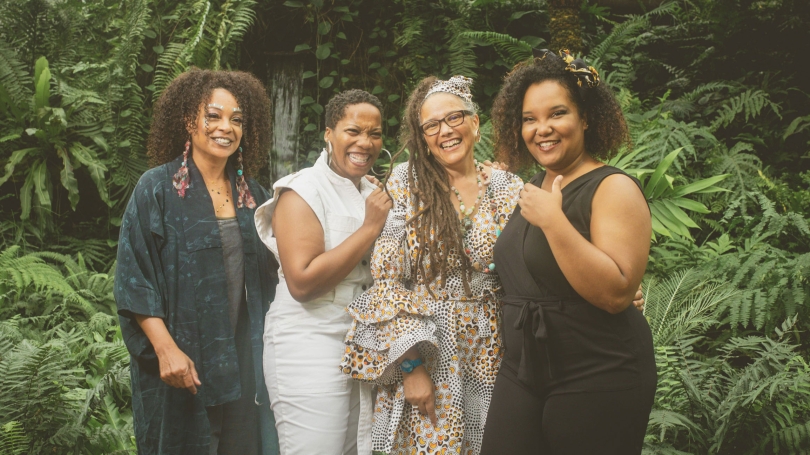Nicole Mitchell brings Afro-Folk-Futurism to the Hop
This Saturday, October 15, the Hop will welcome flutist and composer Nicole Mitchell to the stage to play a style of music she calls "Afro-Folk Futurism" with her quartet, Black Earth SWAY. Student group The Coast Jazz Orchestra will open for Mitchell with a rendition of one of her early pieces–the first movement from one of Mitchell's early CDs, Afrika Rising, called The Ancient Power Awakens.
"[The Ancient Power Awakens] is a great piece that digs into some of the core rhythmic constructs of black music," Coast Jazz Director Taylor Ho Bynum said. The rhythm units that make up this piece, along with most other African music, can be split into either three beats or two beats, creating a rhythmic tension that makes up the "DNA" of music that is influenced by West African music, he explained. "This piece Nicole wrote is looking at those rhythms, with melodies across the top."
Mitchell described this piece as a tribute to the resilience of Black people. For the Coast's performance, Bynum extracted the rhythm and melodies from the piece, and the group will improvise the rest.
"We come together to make a sound that only we can make together but that we've never made before," Bynum said. "We will use the materials Nicole brought us to dig into the performance practice off the page–listening to each other, responding to each other, developing a musical culture of trust and taking risks."
A performance by Black Earth SWAY will follow the student performance. Bynum is excited for his students to first practice their music before an audience, and then have the opportunity to watch professional musicians play.
"The experience [of listening to] musicians of this caliber is invaluable," Bynum said. "It's the only way you can learn this music. It's like learning a language, it's extraordinarily eloquent, you have to hear it."
Black Earth SWAY is a group made up of four women–Mitchell, Coco Elysses, Alexis Lombre, and JoVia Armstrong. During their performance, these women will explore different aspects of their musicianship that they have never shared before. For example, though Mitchell typically plays the flute and has in the past hired singers to perform her lyrics, this Saturday, she will sing her songs herself.
"For me, singing is really vulnerable. I don't think I'm that great of a singer, but for my liberation I need to sing even if it's not amazing," Mitchell said. "And the audience can feel the courage it takes to do it and they can feel the nakedness of it. This music is a space for us to be authentically raw and ourselves. A lot of times jazz is about proving, oh, you can do this, you can do that. This group isn't trying to prove anything. We're trying to just be."
At the center of their performance is an instrument called the diddley bow, which will be played by Coco Elysses. The diddley bow is a type of guitar with just one string, sometimes called a "box guitar" because it was originally made from a cigar box with a stick for a neck, and is an African American folk instrument.
"Back in the day, musicians didn't have enough money to buy instruments so they made their own instruments," Mitchell said. "There's a long tradition with this instrument that came from Africa."
In many ways, Black Earth SWAY's performance is made up of new music in conversation with old traditions. Their performance will illustrate the ways in which musicians do not have to limit themselves to specific genres, as their performance will flow from one genre to the next–from the sounds of pop music to funk to blues–and will test the boundaries between traditional music and experimental music.
"We call our music Afro-Folk futurism," Mitchell said. "Folk music is people's music–it's about community, it's about being together. We're great friends, you'll feel that in the audience–this is friendship. And then we have futurism; what's most futuristic is the freedom we have to express ourselves in this moment in time as black women and the support we give each other."
Mitchell hopes her performance might inspire the audience to get up and dance.
"Maybe they will see that you can still dance to jazz," she said. "In the beginning, jazz was all about dancing, and then it got a little more complicated [in the 1950's] because jazz became a 'high brow' music played in clubs where intellectuals would go to socialize; to drink and talk but not to dance."
Mitchell also hopes her performance will show the audience and Bynum's students that it's okay to have fun as a performer.
"I think students work really hard to present the music that they practiced and practiced," Mitchell said. "It becomes really serious, but isn't it the whole point to have fun?"
